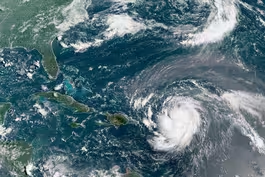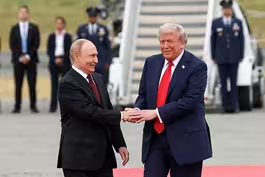
How AI-generated models are shaking up the fashion industry
Clip: 8/16/2025 | 7m 49sVideo has Closed Captions
AI-generated models shake up the fashion industry and raise concerns
The rise of artificial intelligence has touched nearly every industry, disrupting long-established workflows and raising concerns about job losses. Now, the fashion world is reckoning with these changes as AI takes hold, from virtual fitting rooms to AI avatars starring in marketing campaigns. Ali Rogin reports on the refashioning of the industry and why it’s raising alarms.
Problems playing video? | Closed Captioning Feedback
Problems playing video? | Closed Captioning Feedback
Major corporate funding for the PBS News Hour is provided by BDO, BNSF, Consumer Cellular, American Cruise Lines, and Raymond James. Funding for the PBS NewsHour Weekend is provided by...

How AI-generated models are shaking up the fashion industry
Clip: 8/16/2025 | 7m 49sVideo has Closed Captions
The rise of artificial intelligence has touched nearly every industry, disrupting long-established workflows and raising concerns about job losses. Now, the fashion world is reckoning with these changes as AI takes hold, from virtual fitting rooms to AI avatars starring in marketing campaigns. Ali Rogin reports on the refashioning of the industry and why it’s raising alarms.
Problems playing video? | Closed Captioning Feedback
How to Watch PBS News Hour
PBS News Hour is available to stream on pbs.org and the free PBS App, available on iPhone, Apple TV, Android TV, Android smartphones, Amazon Fire TV, Amazon Fire Tablet, Roku, Samsung Smart TV, and Vizio.
Providing Support for PBS.org
Learn Moreabout PBS online sponsorshipJOHN YANG: The rise of artificial intelligence# has touched virtually every industry,## disrupting long established workflows# and raising concerns about job losses.
Now the fashion world is reckoning with# these changes as AI takes hold there,## from customer service chatbots to virtual fitting# rooms and AI avatars starring in marketing## campaigns.
Ali Rogin explores this refashioning# of the industry and why it's raising alarms.
ALI ROGIN (voice-over): This August's Vogue# magazine may give us a glimpse into the future## of fashion.
This ad features a new model styled in# outfits from the clothing brand Guess.
She gazes## into the camera with a wide smile and bright eyes,# and none of it is real.
She was generated by AI.
VALENTINA GONZALEZ, Seraphine Valora:# Right now we're at a point where we## can create the same level of quality,# of beauty, of compositions with AI.## And you don't have to deal with a lot# of logistics, so why not utilize it?
ALI ROGIN (voice-over): Valentina Gonzalez Andreaa# Petrescu are the co-founders of Seraphine Valora,## the AI modeling agency behind the# ad that's garnered so much att.
ANDREAA PETRESCU, Seraphine Valora:# We believe that AI is the future of## fashion in the sense of supplementing# and offering a new avenue of marketing.
ALI ROGIN (voice-over): Some have called for# a boycott of Vogue for giving it a platform.## But this ad wasn't the first to use AI models.# In March, fashion brand H and M experimented## with a new marketing strategy by digitally# cloning actual models with their consent.
SARA ZIFF, Model Alliance: This# appeared to be almost more of a## campaign for using AI generated# models than a clothing campaign.
ALI ROGIN (voice-over): Sarah Ziff is a# former model who founded the Model Alliance,## an advocacy group for workers in the# industry.
She recalls how just two years ago,## the brand Levi's was under fire for planning# to promote diversity by using AI models.
SARA ZIFF: It's important that companies# actually celebrate diverse people, not just## sort of showcase an avatar who is diverse.
ALI ROGIN (voice-over): For many brands, AI# models are viewed as a cost saving alternative## to elaborate photo shoots.
Industry insiders# warned that would take away many traditional## jobs, while proponents of AI argue that# they're just creating different jobs.
VALENTINA GONZALEZ: We open a# new opportunity for a different,## completely different type of creatives# to expose their work to the biggest## fashion magazines.
And that's the# conversation we should be having.
ALI ROGIN: To continue that conversation,## I'm joined by Sinead Bovell, a former# model turned tech entrepreneur .. studies AI's impact on society.
She's also# the founder of Waye, a tech education company.
Sinead, thank you so much for being# here.
You predicted this moment that## we are now in back in 2020.
You wrote an# op ed about it in ironically in Vogue.## Is this a moment, a turning point in the# use of AI within the fashion industry?
SINEAD BOVELL, WAYE Founder: Why I think it# is a turning point is because I and I think## many people kind of look to Vogue in some# ways as like Supreme Court of Fashion.
So## by AI appearing in one of their magazines, one# of the most sought after exclusive magazines,## it's almost like it's the industry stamp# of approval on the supplier side in a way## that AI is here to stay and acceptable# at the highest ranking order of fashion.
ALI ROGIN: And this Guess ad has elicited# strong opinions, a lot of controversy,## particularly when it comes to beauty standards# and what it means for reshaping the standards## that people look to.
The co-founders behind this# ad touched on this point.
Here's what they said.
ANDREAA PETRESCU: I would argue that it's# actually more freeing for a woman to know## that these images are made with AI and that they# are don't exist and that they're just a digital## created through a digital medium.
And# so the woman in the pictures actually## didn't perhaps starve for herself.# Or I believe it's maybe more freeing## because you actually don't compare# with something that doesn't exist.
SINEAD BOVELL: So that's really interesting# perspective.
I agree that looking at an AI## generated figure, we might start to# say, well, because this isn't real,## I don't even see the value in comparing# myself to it.
But the problem is in some## ways AI has crossed over that uncanny valley# where we can understand that it's not real.
So the only way that perspective# is going to work is if it's clearly## identified that the figure you're looking# at is AI generated without that labeling,## which there is no kind of industry rule# that has to happen, we really have no idea.
And that's still a pretty broad# assumption.
Because they're so## perfect and because they're AI# people won't compare themselves## to it.
I think we would have to leave that# question to the Department of Psychology.
ALI ROGIN: What is the obligation, in your mind,# that fashion companies, AI companies have to## disclose the use of these models?
And where does# that conversation stand right now in the industry?
SINEAD BOVELL: In some ways it could be argued# that there is a lot of editing that happens in## photoshoots anyways, and that transparency# has never been declared for viewers.
In## the last couple of years, people have started to# demand more natural, more realistic photography.
But when it comes to AI, if were to continue# that line of this kind of blurry, how much## is real?
How much was edited?
But this actually# isn't a question that's even unique to fashion,## right?
We're all trying to grapple# with how do we understand what is## real and what is not in an AI first# world?
And it just so happens that## this is also going to apply to an# industry like fashion and shopping.
ALI ROGIN: When we talk about fashion,# we're talking about an industry that's## never been known as being great on# representation in terms of body size,## racial diversity.
So how does# the introduction of AI into this## conversation change the debate over# representation in the modeling world?
SINEAD BOVELL: Models themselves have worked# really hard to build an industry in the last## couple of years that is more reflective of the# breadth and depth of diversity we see in society.## And so what happens to the gains from those actual# models who are now kind of kicked off the payroll?
And then the second is there's kind# of unique areas for exploitation to## occur here.
So a company could just# generate the illusion of diversity## and create characters from a community that# perhaps nobody in that fashion company or## in that brand has anybody on the play# role that represents that community.
So you're profiting off of a community# that you're speaking on behalf of.
And## maybe that community would have not worked# with that brand.
So you get to kind of## take control over where communities appear in# advertising, which I think could be problematic.
And then the second area for exploitation is# misrepresentation, right?
So you could create an## identity of, say, an AI generated black woman# that misrepresents that community.
So there## are all of these kind of strange areas, and# I call it digital cultural appropriation,## where it's not illegal, right?
Cultural# appropriation is of course not illegal,## but we as a society decided this probably# isn't a good thing.
Let's draw a line here.
And it doesn't mean all AI characters have to# represent the exact people in the companies.
No,## that's kind of ridiculous.
But we do have# to figure out what are the new lines of## representation in an era when you can generate# identities using artificial intelligence.
ALI ROGIN: Wow, such interesting questions.# Sinead Bovell, thank you so much.
SINEAD BOVELL: Thanks for having me.
How revoking a key EPA regulation may hurt children’s health
Video has Closed Captions
Clip: 8/16/2025 | 5m | How a White House plan to overturn a key EPA regulation threatens children’s health (5m)
News Wrap: Hurricane Erin strengthens into Category 5 storm
Video has Closed Captions
Clip: 8/16/2025 | 2m 20s | News Wrap: Hurricane Erin strengthens into Category 5 storm (2m 20s)
Security expert analyzes Trump’s new alignment with Putin
Video has Closed Captions
Clip: 8/16/2025 | 5m 58s | Security expert analyzes fallout of Trump’s alignment with Putin after their summit (5m 58s)
Providing Support for PBS.org
Learn Moreabout PBS online sponsorshipSupport for PBS provided by:
Major corporate funding for the PBS News Hour is provided by BDO, BNSF, Consumer Cellular, American Cruise Lines, and Raymond James. Funding for the PBS NewsHour Weekend is provided by...














